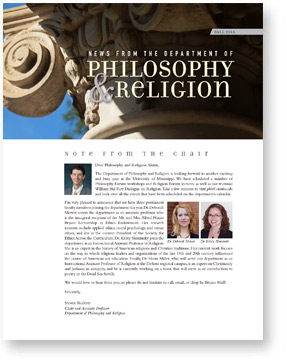Adjunct Professor of Religion
Bryant Hall 100 | 662–915-7020 | forrest@olemiss.edu
Professional Background
I received my Ph.D. in Religious Studies from Harvard University in 2000. I received the Ford Foundation Postdoctoral Research Fellowship in 2007, which I competed at Harvard University. After teaching at Centre College in Danville, KY for three years, I joined the University of Mississippi faculty in 2012.
Teaching and Courses Offered
REL 101 Introduction to Religion
REL 320 Hinduism
Research Interests
My research focuses on Middle Persian texts, particularly polemic and apologetic Zoroastrian works and how they were affected by a new style of exegesis Islam introduced into Iran by the 8th century. The result was a change in the way theologians of this ancient tradition began to present it to outsiders, systematically analyzing concepts they previously simply accepted on faith.
In my book Witches, Whores, and Sorcerers: the Concept of Evil in Early Iran, I examined the idea of evil found in ancient Avestan and Middle Persian Pahlavi Zoroastrian texts. In these scriptures, evil was strongly linked to women and other outsiders to organized religion. This resulted in ritual and social practices that placed them outside of the formal religious sphere. They formed separate religious and ritual spaces, which, while allowing them spiritual solace, also evolved into the practice of medicine, both herbal and magical. Ancient Iranians, like most ancient people, believed that illnesses of all kinds were ultimately the work of demons or their demonic human helpers. The priests believed that only the most dreadful of demons inflicted female illnesses. Priests forbade the knowledge of cures to women and so they created mantric and herbal cures themselves. Many priests came to believe that women who battled these demons finally succumbed to them and became witches and sorceresses. Men and women who neglected purity rules likewise became witches, whores, or sorcerers.
Publications
Witches, Whores, and Sorcerers: the Concept of Evil in Early Iran. Austin: University of Texas Press, 2011.

